初中英语易错集锦大全211道题
中考英语 易错集锦大全211道题
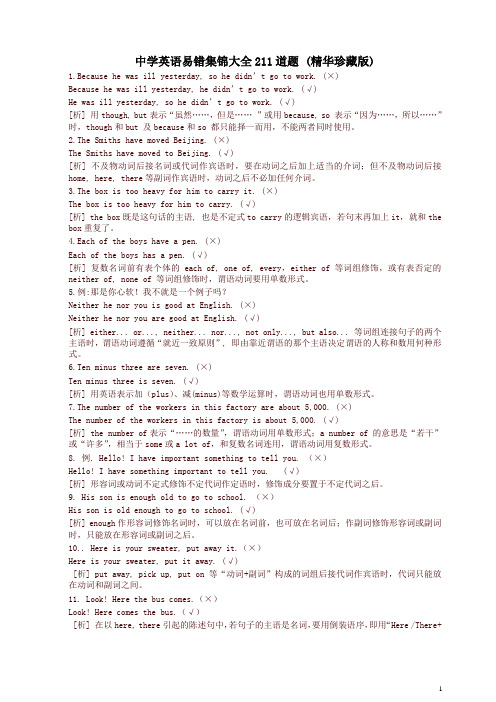
中学英语易错集锦大全211道题 (精华珍藏版)1.Because he was ill yesterday, so he didn’t go to work. (×)Because he was ill yesterday, he didn’t go to work. (√)He was ill yesterday, so he didn’t go to work. (√)[析] 用though, but表示“虽然……,但是……”或用because, so 表示“因为……,所以……”时,though和but 及because和so 都只能择一而用,不能两者同时使用。
2.The Smiths have moved Beijing. (×)The Smiths have moved to Beijing. (√)[析] 不及物动词后接名词或代词作宾语时,要在动词之后加上适当的介词;但不及物动词后接home, here, there等副词作宾语时,动词之后不必加任何介词。
3.The box is too heavy for him to carry it. (×)The box is too heavy for him to carry. (√)[析] the box既是这句话的主语, 也是不定式to carry的逻辑宾语,若句末再加上it,就和the box重复了。
4.Each of the boys have a pen. (×)Each of the boys has a pen. (√)[析] 复数名词前有表个体的each of, one of, every,either of等词组修饰,或有表否定的neither of, none of 等词组修饰时,谓语动词要用单数形式。
5.例:那是你心软!我不就是一个例子吗?Neither he nor you is good at English. (×)Neither he nor you are good at English. (√)[析] either... or..., neither... nor..., not only..., but also... 等词组连接句子的两个主语时,谓语动词遵循“就近一致原则”, 即由靠近谓语的那个主语决定谓语的人称和数用何种形式。
中学英语易错集锦大全211道题 (精华珍藏版)
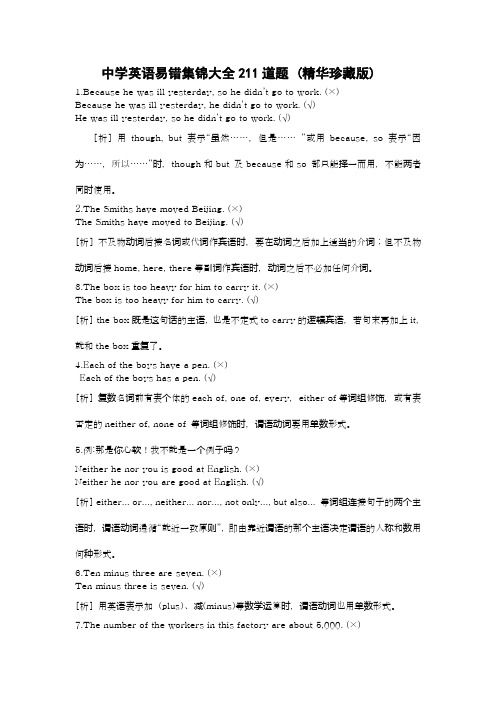
中学英语易错集锦大全211道题 (精华珍藏版)1.Because he was ill yesterday, so he didn’t go to work. (×)Because he was ill yesterday, he didn’t go to work. (√)He was ill yesterday, so he didn’t go to work. (√)[析] 用though, but表示“虽然……,但是……”或用because, so 表示“因为……,所以……”时,though和but 及because和so 都只能择一而用,不能两者同时使用。
2.The Smiths have moved Beijing. (×)The Smiths have moved to Beijing. (√)[析] 不及物动词后接名词或代词作宾语时,要在动词之后加上适当的介词;但不及物动词后接home, here, there等副词作宾语时,动词之后不必加任何介词。
3.The box is too heavy for him to carry it. (×)The box is too heavy for him to carry. (√)[析] the box既是这句话的主语, 也是不定式to carry的逻辑宾语,若句末再加上it,就和the box重复了。
4.Each of the boys have a pen. (×)Each of the boys has a pen. (√)[析] 复数名词前有表个体的each of, one of, every,either of等词组修饰,或有表否定的neither of, none of 等词组修饰时,谓语动词要用单数形式。
5.例:那是你心软!我不就是一个例子吗?Neither he nor you is good at English. (×)Neither he nor you are good at English. (√)[析] either... or..., neither... nor..., not only..., but also... 等词组连接句子的两个主语时,谓语动词遵循“就近一致原则”, 即由靠近谓语的那个主语决定谓语的人称和数用何种形式。
中考英语 易错集锦大全211道题
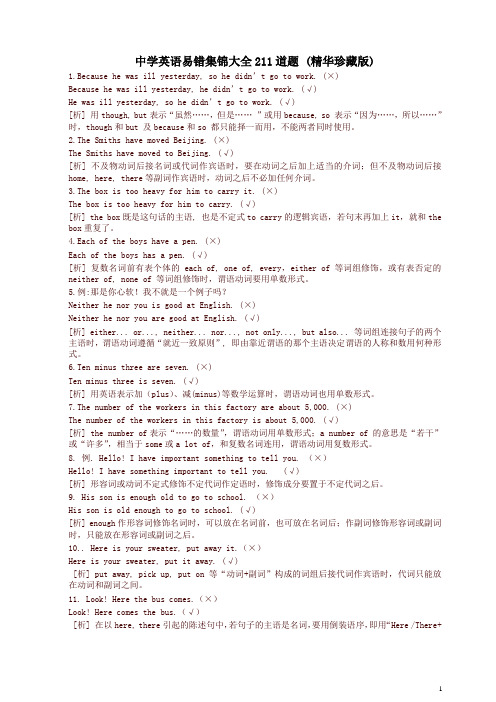
中学英语易错集锦大全211道题 (精华珍藏版)1.Because he was ill yesterday, so he didn’t go to work. (×)Because he was ill yesterday, he didn’t go to work. (√)He was ill yesterday, so he didn’t go to work. (√)[析] 用though, but表示“虽然……,但是……”或用because, so 表示“因为……,所以……”时,though和but 及because和so 都只能择一而用,不能两者同时使用。
2.The Smiths have moved Beijing. (×)The Smiths have moved to Beijing. (√)[析] 不及物动词后接名词或代词作宾语时,要在动词之后加上适当的介词;但不及物动词后接home, here, there等副词作宾语时,动词之后不必加任何介词。
3.The box is too heavy for him to carry it. (×)The box is too heavy for him to carry. (√)[析] the box既是这句话的主语, 也是不定式to carry的逻辑宾语,若句末再加上it,就和the box重复了。
4.Each of the boys have a pen. (×)Each of the boys has a pen. (√)[析] 复数名词前有表个体的each of, one of, every,either of等词组修饰,或有表否定的neither of, none of 等词组修饰时,谓语动词要用单数形式。
5.例:那是你心软!我不就是一个例子吗?Neither he nor you is good at English. (×)Neither he nor you are good at English. (√)[析] either... or..., neither... nor..., not only..., but also... 等词组连接句子的两个主语时,谓语动词遵循“就近一致原则”, 即由靠近谓语的那个主语决定谓语的人称和数用何种形式。
中学英语易错题集锦
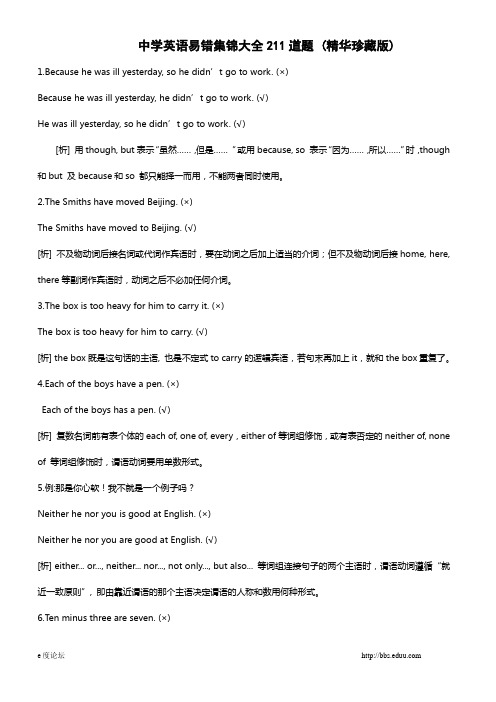
中学英语易错集锦大全211道题 (精华珍藏版)1.Because he was ill yesterday, so he didn’t go to work. (×)Because he was ill yesterday, he didn’t go to work. (√)He was ill yesterday, so he didn’t go to work. (√)[析] 用though, but表示“虽然……,但是……”或用because, so 表示“因为……,所以……”时,though 和but 及because和so 都只能择一而用,不能两者同时使用。
2.The Smiths have moved Beijing. (×)The Smiths have moved to Beijing. (√)[析] 不及物动词后接名词或代词作宾语时,要在动词之后加上适当的介词;但不及物动词后接home, here, there等副词作宾语时,动词之后不必加任何介词。
3.The box is too heavy for him to carry it. (×)The box is too heavy for him to carry. (√)[析] the box既是这句话的主语, 也是不定式to carry的逻辑宾语,若句末再加上it,就和the box重复了。
4.Each of the boys have a pen. (×)Each of the boys has a pen. (√)[析] 复数名词前有表个体的each of, one of, every,either of等词组修饰,或有表否定的neither of, none of 等词组修饰时,谓语动词要用单数形式。
5.例:那是你心软!我不就是一个例子吗?Neither he nor you is good at English. (×)Neither he nor you are good at English. (√)[析] either... or..., neither... nor..., not only..., but also... 等词组连接句子的两个主语时,谓语动词遵循“就近一致原则”, 即由靠近谓语的那个主语决定谓语的人称和数用何种形式。
中学英语易错题集锦大全
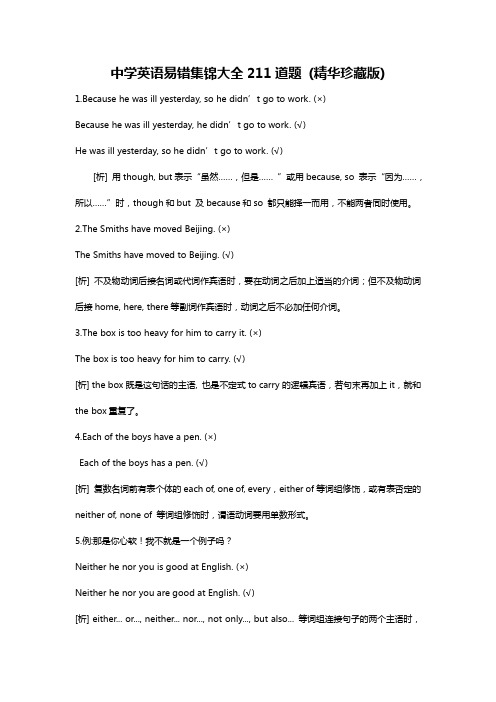
中学英语易错集锦大全211道题(精华珍藏版)1.Because he was ill yesterday, so he didn’t go to work. (×)Because he was ill yesterday, he didn’t go to work. (√)He was ill yesterday, so he didn’t go to work. (√)[析] 用though, but表示“虽然……,但是……”或用because, so 表示“因为……,所以……”时,though和but 及because和so 都只能择一而用,不能两者同时使用。
2.The Smiths have moved Beijing. (×)The Smiths have moved to Beijing. (√)[析] 不及物动词后接名词或代词作宾语时,要在动词之后加上适当的介词;但不及物动词后接home, here, there等副词作宾语时,动词之后不必加任何介词。
3.The box is too heavy for him to carry it. (×)The box is too heavy for him to carry. (√)[析] the box既是这句话的主语, 也是不定式to carry的逻辑宾语,若句末再加上it,就和the box重复了。
4.Each of the boys have a pen. (×)Each of the boys has a pen. (√)[析] 复数名词前有表个体的each of, one of, every,either of等词组修饰,或有表否定的neither of, none of 等词组修饰时,谓语动词要用单数形式。
5.例:那是你心软!我不就是一个例子吗?Neither he nor you is good at English. (×)Neither he nor you are good at English. (√)[析] either... or..., neither... nor..., not only..., but also... 等词组连接句子的两个主语时,谓语动词遵循“就近一致原则”, 即由靠近谓语的那个主语决定谓语的人称和数用何种形式。
中学英语易错集锦大全211道题 (精华珍藏版)

中学英语易错集锦大全211道题(精华珍藏版)本人所整理收集内容基本囊括初中阶段英语易错内容大全1.Because he was ill yesterday, so he didn’t go to work. (×)Because he was ill yesterday, he didn’t go to work. (√)He was ill yesterday, so he didn’t go to work. (√)[析] 用though, but表示“虽然……,但是…… ”或用because, so 表示“因为……,所以……”时,though 和but 及because和so 都只能择一而用,不能两者同时使用。
2.The Smiths have moved Beijing. (×) The Smiths have moved to Beijing. (√)[析] 不及物动词后接名词或代词作宾语时,要在动词之后加上适当的介词;但不及物动词后接home, here, there等副词作宾语时,动词之后不必加任何介词。
3.The box is too heavy for him to carry it. (×) The box is too heavy for him to carry. (√)[析] the box既是这句话的主语, 也是不定式to carry的逻辑宾语,若句末再加上it,就和the box 重复了。
4.Each of the boys have a pen. (×) Each of the boys has a pen. (√)[析] 复数名词前有表个体的each of, one of, every,either of等词组修饰,或有表否定的neither of, none of 等词组修饰时,谓语动词要用单数形式。
5.例:那是你心软!我不就是一个例子吗?Neither he nor you is good at English. (×) Neither he nor you are good at English. (√)[析] either... or..., neither... nor..., not only..., but also... 等词组连接句子的两个主语时,谓语动词遵循“就近一致原则”, 即由靠近谓语的那个主语决定谓语的人称和数用何种形式。
中学英语易错集锦大全 211 道题 (精华珍藏版)
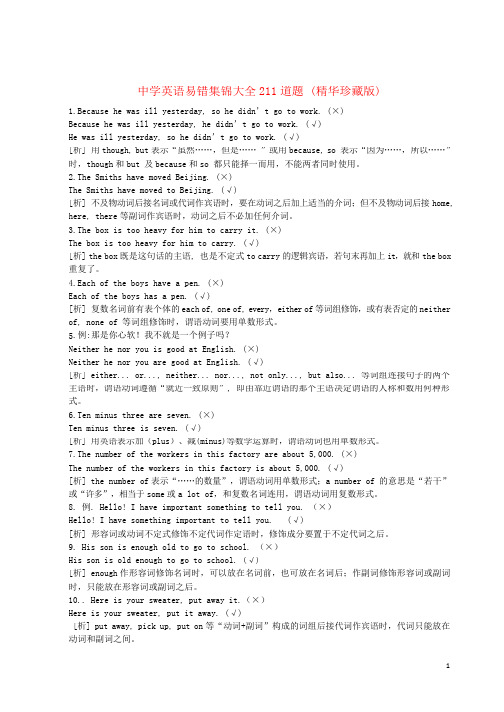
in China. (√)
[析] “any city in China”包括了重庆这座城市, 同一事物自己与自己不能做比较,只有在 city
前加上 other 才能表示重庆和中国的其它城市比较大小。
The weather in Guangzhou is warmer than Beijing. (×)
B.
So he is(√)
[析] “so+be 动词/助动词+主语”的倒装结构表示前面所述情况也适用于后者,意为“……也是这
样”;“so+主语+be 动词/助动词”的陈述结构表示对前述情况的肯定,意为“……确实如此”。
13.重庆比中国的其他城市都大。
Chongqing is larger than any city in China. (×)Chongqing is larger than any other city
married/will marry with B。
15. 例 There is going to have a film tonight. (×) There is going to be a film tonight.
(√)
[析] 一般将来时用在 There be 句式中时,be going to 或 will 之后的动词原形只能用 be,也就
[析] 习惯上在含有宾语从句的复合句中,主句的谓语动词用了一般过去时,从句的谓语动词要用
过去的某种时态。但如果从句表述的是一客观事实或客观真理时,则不受主句时态的影响,l the balls are not round. 翻译成汉语:
所有的球都不是圆的。(×)并不是所有的球都是圆的。(√)
A.
7 minutes walk B. 7 minute walk C. 7 minutes' walk D. 7 minute's walk
中学英语易错题集锦大全211道题(精华珍藏版)

中学英语易错集锦大全211道题(精华珍藏版)1.Because he was ill yesterday, so he didn’t go to work. (×)Because he was ill yesterday, he didn’t go to work. (√)He was ill yesterday, so he didn’t go to work. (√)[析] 用though, but表示“虽然……,但是……”或用because, so 表示“因为……,所以……”时,though和but 及because和so 都只能择一而用,不能两者同时使用。
2.The Smiths have moved Beijing. (×)The Smiths have moved to Beijing. (√)[析] 不及物动词后接名词或代词作宾语时,要在动词之后加上适当的介词;但不及物动词后接home, here, there等副词作宾语时,动词之后不必加任何介词。
3.The box is too heavy for him to carry it. (×)The box is too heavy for him to carry. (√)[析] the box既是这句话的主语, 也是不定式to carry的逻辑宾语,若句末再加上it,就和the box重复了。
4.Each of the boys have a pen. (×)Each of the boys has a pen. (√)[析] 复数名词前有表个体的each of, one of, every,either of等词组修饰,或有表否定的neither of, none of 等词组修饰时,谓语动词要用单数形式。
Neither he nor you is good at English. (×)Neither he nor you are good at English. (√)[析] either... or..., neither... nor..., not only..., but also... 等词组连接句子的两个主语时,谓语动词遵循“就近一致原则”, 即由靠近谓语的那个主语决定谓语的人称和数用何种形式。
中考英语 易错集锦大全211道题

中学英语易错集锦大全211道题 (精华珍藏版)1.Because he was ill yesterday, so he didn’t go to work. (×)Because he was ill yesterday, he didn’t go to work. (√)He was ill yesterday, so he didn’t go to work. (√)[析] 用though, but表示“虽然……,但是……”或用because, so 表示“因为……,所以……”时,though和but 及because和so 都只能择一而用,不能两者同时使用。
2.The Smiths have moved Beijing. (×)The Smiths have moved to Beijing. (√)[析] 不及物动词后接名词或代词作宾语时,要在动词之后加上适当的介词;但不及物动词后接home, here, there等副词作宾语时,动词之后不必加任何介词。
3.The box is too heavy for him to carry it. (×)The box is too heavy for him to carry. (√)[析] the box既是这句话的主语, 也是不定式to carry的逻辑宾语,若句末再加上it,就和the box重复了。
4.Each of the boys have a pen. (×)Each of the boys has a pen. (√)[析] 复数名词前有表个体的each of, one of, every,either of等词组修饰,或有表否定的neither of, none of 等词组修饰时,谓语动词要用单数形式。
5.例:那是你心软!我不就是一个例子吗?Neither he nor you is good at English. (×)Neither he nor you are good at English. (√)[析] either... or..., neither... nor..., not only..., but also... 等词组连接句子的两个主语时,谓语动词遵循“就近一致原则”, 即由靠近谓语的那个主语决定谓语的人称和数用何种形式。
中考英语 易错集锦大全211道题
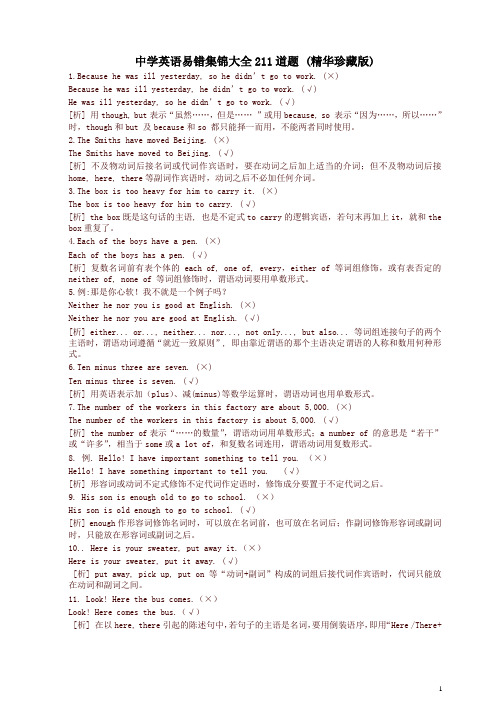
中学英语易错集锦大全211道题 (精华珍藏版)1.Because he was ill yesterday, so he didn’t go to work. (×)Because he was ill yesterday, he didn’t go to work. (√)He was ill yesterday, so he didn’t go to work. (√)[析] 用though, but表示“虽然……,但是……”或用because, so 表示“因为……,所以……”时,though和but 及because和so 都只能择一而用,不能两者同时使用。
2.The Smiths have moved Beijing. (×)The Smiths have moved to Beijing. (√)[析] 不及物动词后接名词或代词作宾语时,要在动词之后加上适当的介词;但不及物动词后接home, here, there等副词作宾语时,动词之后不必加任何介词。
3.The box is too heavy for him to carry it. (×)The box is too heavy for him to carry. (√)[析] the box既是这句话的主语, 也是不定式to carry的逻辑宾语,若句末再加上it,就和the box重复了。
4.Each of the boys have a pen. (×)Each of the boys has a pen. (√)[析] 复数名词前有表个体的each of, one of, every,either of等词组修饰,或有表否定的neither of, none of 等词组修饰时,谓语动词要用单数形式。
5.例:那是你心软!我不就是一个例子吗?Neither he nor you is good at English. (×)Neither he nor you are good at English. (√)[析] either... or..., neither... nor..., not only..., but also... 等词组连接句子的两个主语时,谓语动词遵循“就近一致原则”, 即由靠近谓语的那个主语决定谓语的人称和数用何种形式。
中考英语 易错集锦大全211道题
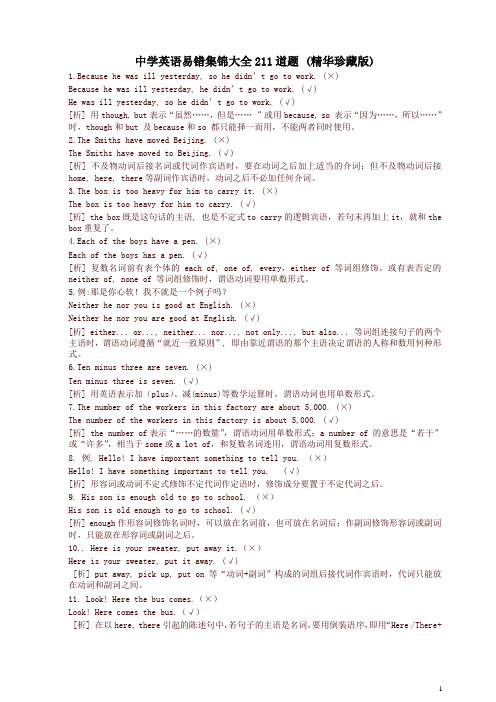
中学英语易错集锦大全211道题 (精华珍藏版)1.Because he was ill yesterday, so he didn’t go to work. (×)Because he was ill yesterday, he didn’t go to work. (√)He was ill yesterday, so he didn’t go to work. (√)[析] 用though, but表示“虽然……,但是……”或用because, so 表示“因为……,所以……”时,though和but 及because和so 都只能择一而用,不能两者同时使用。
2.The Smiths have moved Beijing. (×)The Smiths have moved to Beijing. (√)[析] 不及物动词后接名词或代词作宾语时,要在动词之后加上适当的介词;但不及物动词后接home, here, there等副词作宾语时,动词之后不必加任何介词。
3.The box is too heavy for him to carry it. (×)The box is too heavy for him to carry. (√)[析] the box既是这句话的主语, 也是不定式to carry的逻辑宾语,若句末再加上it,就和the box重复了。
4.Each of the boys have a pen. (×)Each of the boys has a pen. (√)[析] 复数名词前有表个体的each of, one of, every,either of等词组修饰,或有表否定的neither of, none of 等词组修饰时,谓语动词要用单数形式。
5.例:那是你心软!我不就是一个例子吗?Neither he nor you is good at English. (×)Neither he nor you are good at English. (√)[析] either... or..., neither... nor..., not only..., but also... 等词组连接句子的两个主语时,谓语动词遵循“就近一致原则”, 即由靠近谓语的那个主语决定谓语的人称和数用何种形式。
中考英语 易错集锦大全211道题

中学英语易错集锦大全211道题 (精华珍藏版)1.Because he was ill yesterday, so he didn’t go to work. (×)Because he was ill yesterday, he didn’t go to work. (√)He was ill yesterday, so he didn’t go to work. (√)[析] 用though, but表示“虽然……,但是……”或用because, so 表示“因为……,所以……”时,though和but 及because和so 都只能择一而用,不能两者同时使用。
2.The Smiths have moved Beijing. (×)The Smiths have moved to Beijing. (√)[析] 不及物动词后接名词或代词作宾语时,要在动词之后加上适当的介词;但不及物动词后接home, here, there等副词作宾语时,动词之后不必加任何介词。
3.The box is too heavy for him to carry it. (×)The box is too heavy for him to carry. (√)[析] the box既是这句话的主语, 也是不定式to carry的逻辑宾语,若句末再加上it,就和the box重复了。
4.Each of the boys have a pen. (×)Each of the boys has a pen. (√)[析] 复数名词前有表个体的each of, one of, every,either of等词组修饰,或有表否定的neither of, none of 等词组修饰时,谓语动词要用单数形式。
5.例:那是你心软!我不就是一个例子吗?Neither he nor you is good at English. (×)Neither he nor you are good at English. (√)[析] either... or..., neither... nor..., not only..., but also... 等词组连接句子的两个主语时,谓语动词遵循“就近一致原则”, 即由靠近谓语的那个主语决定谓语的人称和数用何种形式。
中考英语 易错集锦大全211道题
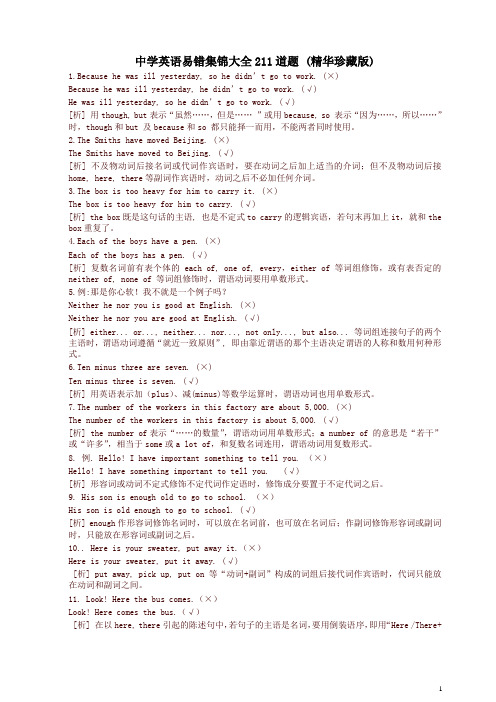
中学英语易错集锦大全211道题 (精华珍藏版)1.Because he was ill yesterday, so he didn’t go to work. (×)Because he was ill yesterday, he didn’t go to work. (√)He was ill yesterday, so he didn’t go to work. (√)[析] 用though, but表示“虽然……,但是……”或用because, so 表示“因为……,所以……”时,though和but 及because和so 都只能择一而用,不能两者同时使用。
2.The Smiths have moved Beijing. (×)The Smiths have moved to Beijing. (√)[析] 不及物动词后接名词或代词作宾语时,要在动词之后加上适当的介词;但不及物动词后接home, here, there等副词作宾语时,动词之后不必加任何介词。
3.The box is too heavy for him to carry it. (×)The box is too heavy for him to carry. (√)[析] the box既是这句话的主语, 也是不定式to carry的逻辑宾语,若句末再加上it,就和the box重复了。
4.Each of the boys have a pen. (×)Each of the boys has a pen. (√)[析] 复数名词前有表个体的each of, one of, every,either of等词组修饰,或有表否定的neither of, none of 等词组修饰时,谓语动词要用单数形式。
5.例:那是你心软!我不就是一个例子吗?Neither he nor you is good at English. (×)Neither he nor you are good at English. (√)[析] either... or..., neither... nor..., not only..., but also... 等词组连接句子的两个主语时,谓语动词遵循“就近一致原则”, 即由靠近谓语的那个主语决定谓语的人称和数用何种形式。
中考英语 易错集锦大全211道题
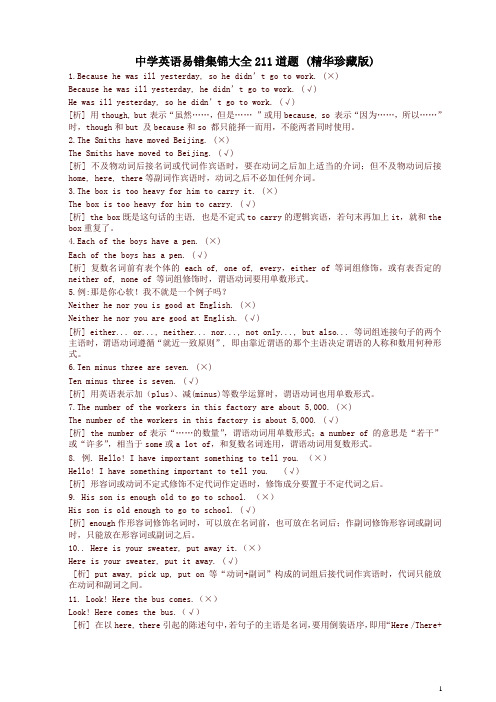
中学英语易错集锦大全211道题 (精华珍藏版)1.Because he was ill yesterday, so he didn’t go to work. (×)Because he was ill yesterday, he didn’t go to work. (√)He was ill yesterday, so he didn’t go to work. (√)[析] 用though, but表示“虽然……,但是……”或用because, so 表示“因为……,所以……”时,though和but 及because和so 都只能择一而用,不能两者同时使用。
2.The Smiths have moved Beijing. (×)The Smiths have moved to Beijing. (√)[析] 不及物动词后接名词或代词作宾语时,要在动词之后加上适当的介词;但不及物动词后接home, here, there等副词作宾语时,动词之后不必加任何介词。
3.The box is too heavy for him to carry it. (×)The box is too heavy for him to carry. (√)[析] the box既是这句话的主语, 也是不定式to carry的逻辑宾语,若句末再加上it,就和the box重复了。
4.Each of the boys have a pen. (×)Each of the boys has a pen. (√)[析] 复数名词前有表个体的each of, one of, every,either of等词组修饰,或有表否定的neither of, none of 等词组修饰时,谓语动词要用单数形式。
5.例:那是你心软!我不就是一个例子吗?Neither he nor you is good at English. (×)Neither he nor you are good at English. (√)[析] either... or..., neither... nor..., not only..., but also... 等词组连接句子的两个主语时,谓语动词遵循“就近一致原则”, 即由靠近谓语的那个主语决定谓语的人称和数用何种形式。
中考英语 易错集锦大全211道题

中学英语易错集锦大全211道题 (精华珍藏版)1.Because he was ill yesterday, so he didn’t go to work. (×)Because he was ill yesterday, he didn’t go to work. (√)He was ill yesterday, so he didn’t go to work. (√)[析] 用though, but表示“虽然……,但是……”或用because, so 表示“因为……,所以……”时,though和but 及because和so 都只能择一而用,不能两者同时使用。
2.The Smiths have moved Beijing. (×)The Smiths have moved to Beijing. (√)[析] 不及物动词后接名词或代词作宾语时,要在动词之后加上适当的介词;但不及物动词后接home, here, there等副词作宾语时,动词之后不必加任何介词。
3.The box is too heavy for him to carry it. (×)The box is too heavy for him to carry. (√)[析] the box既是这句话的主语, 也是不定式to carry的逻辑宾语,若句末再加上it,就和the box重复了。
4.Each of the boys have a pen. (×)Each of the boys has a pen. (√)[析] 复数名词前有表个体的each of, one of, every,either of等词组修饰,或有表否定的neither of, none of 等词组修饰时,谓语动词要用单数形式。
5.例:那是你心软!我不就是一个例子吗?Neither he nor you is good at English. (×)Neither he nor you are good at English. (√)[析] either... or..., neither... nor..., not only..., but also... 等词组连接句子的两个主语时,谓语动词遵循“就近一致原则”, 即由靠近谓语的那个主语决定谓语的人称和数用何种形式。
中考英语 易错集锦大全211道题
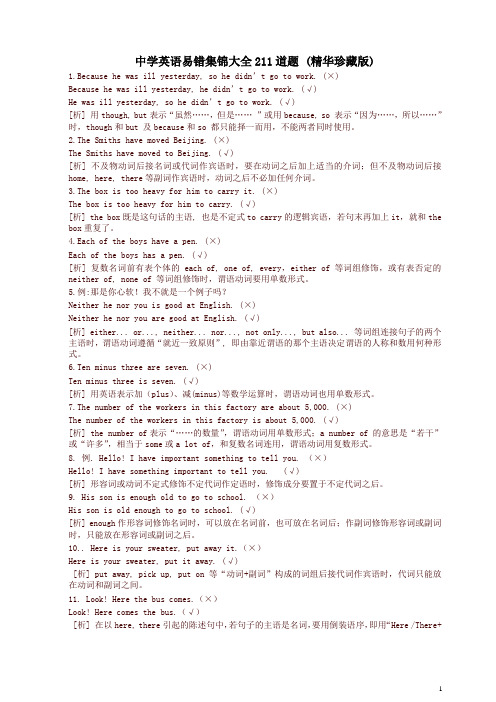
中学英语易错集锦大全211道题 (精华珍藏版)1.Because he was ill yesterday, so he didn’t go to work. (×)Because he was ill yesterday, he didn’t go to work. (√)He was ill yesterday, so he didn’t go to work. (√)[析] 用though, but表示“虽然……,但是……”或用because, so 表示“因为……,所以……”时,though和but 及because和so 都只能择一而用,不能两者同时使用。
2.The Smiths have moved Beijing. (×)The Smiths have moved to Beijing. (√)[析] 不及物动词后接名词或代词作宾语时,要在动词之后加上适当的介词;但不及物动词后接home, here, there等副词作宾语时,动词之后不必加任何介词。
3.The box is too heavy for him to carry it. (×)The box is too heavy for him to carry. (√)[析] the box既是这句话的主语, 也是不定式to carry的逻辑宾语,若句末再加上it,就和the box重复了。
4.Each of the boys have a pen. (×)Each of the boys has a pen. (√)[析] 复数名词前有表个体的each of, one of, every,either of等词组修饰,或有表否定的neither of, none of 等词组修饰时,谓语动词要用单数形式。
5.例:那是你心软!我不就是一个例子吗?Neither he nor you is good at English. (×)Neither he nor you are good at English. (√)[析] either... or..., neither... nor..., not only..., but also... 等词组连接句子的两个主语时,谓语动词遵循“就近一致原则”, 即由靠近谓语的那个主语决定谓语的人称和数用何种形式。
中考英语 易错集锦大全211道题

中学英语易错集锦大全211道题 (精华珍藏版)1.Because he was ill yesterday, so he didn’t go to work. (×)Because he was ill yesterday, he didn’t go to work. (√)He was ill yesterday, so he didn’t go to work. (√)[析] 用though, but表示“虽然……,但是……”或用because, so 表示“因为……,所以……”时,though和but 及because和so 都只能择一而用,不能两者同时使用。
2.The Smiths have moved Beijing. (×)The Smiths have moved to Beijing. (√)[析] 不及物动词后接名词或代词作宾语时,要在动词之后加上适当的介词;但不及物动词后接home, here, there等副词作宾语时,动词之后不必加任何介词。
3.The box is too heavy for him to carry it. (×)The box is too heavy for him to carry. (√)[析] the box既是这句话的主语, 也是不定式to carry的逻辑宾语,若句末再加上it,就和the box重复了。
4.Each of the boys have a pen. (×)Each of the boys has a pen. (√)[析] 复数名词前有表个体的each of, one of, every,either of等词组修饰,或有表否定的neither of, none of 等词组修饰时,谓语动词要用单数形式。
5.例:那是你心软!我不就是一个例子吗?Neither he nor you is good at English. (×)Neither he nor you are good at English. (√)[析] either... or..., neither... nor..., not only..., but also... 等词组连接句子的两个主语时,谓语动词遵循“就近一致原则”, 即由靠近谓语的那个主语决定谓语的人称和数用何种形式。
中学英语易错题集锦大全211道题
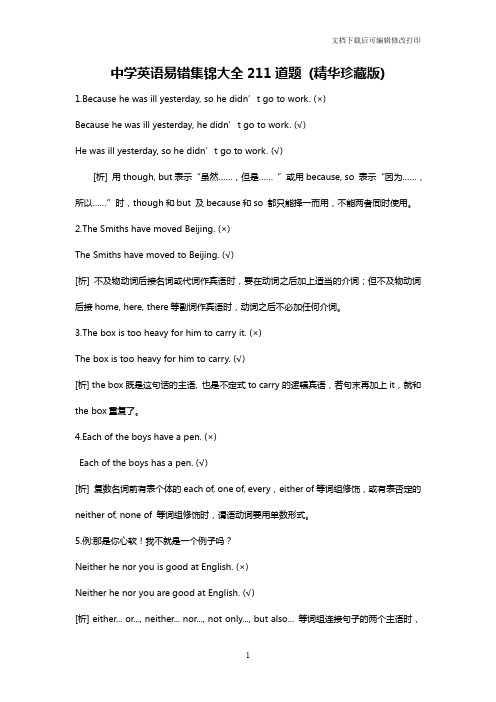
中学英语易错集锦大全211道题(精华珍藏版)1.Because he was ill yesterday, so he didn’t go to work. (×)Because he was ill yesterday, he didn’t go to work. (√)He was ill yesterday, so he didn’t go to work. (√)[析] 用though, but表示“虽然……,但是……”或用because, so 表示“因为……,所以……”时,though和but 及because和so 都只能择一而用,不能两者同时使用。
2.The Smiths have moved Beijing. (×)The Smiths have moved to Beijing. (√)[析] 不及物动词后接名词或代词作宾语时,要在动词之后加上适当的介词;但不及物动词后接home, here, there等副词作宾语时,动词之后不必加任何介词。
3.The box is too heavy for him to carry it. (×)The box is too heavy for him to carry. (√)[析] the box既是这句话的主语, 也是不定式to carry的逻辑宾语,若句末再加上it,就和the box重复了。
4.Each of the boys have a pen. (×)Each of the boys has a pen. (√)[析] 复数名词前有表个体的each of, one of, every,either of等词组修饰,或有表否定的neither of, none of 等词组修饰时,谓语动词要用单数形式。
5.例:那是你心软!我不就是一个例子吗?Neither he nor you is good at English. (×)Neither he nor you are good at English. (√)[析] either... or..., neither... nor..., not only..., but also... 等词组连接句子的两个主语时,谓语动词遵循“就近一致原则”, 即由靠近谓语的那个主语决定谓语的人称和数用何种形式。
中学英语易错题集锦大全211道题(精华珍藏版)
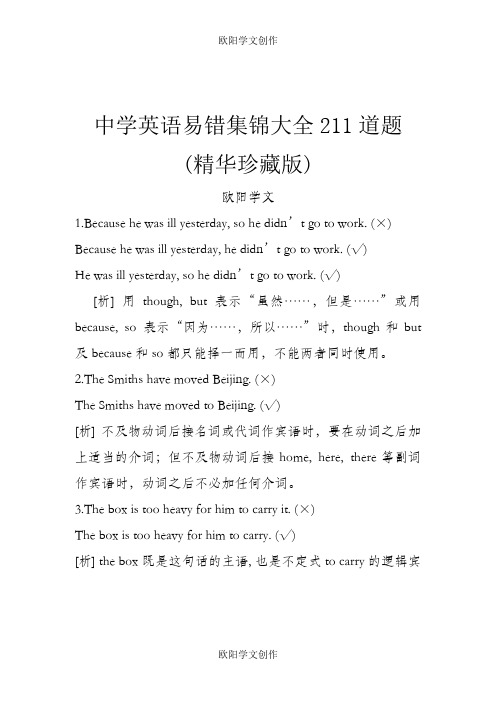
中学英语易错集锦大全211道题(精华珍藏版)欧阳学文1.Because he was ill yesterday, so he didn’t go to work. (×) Because he was ill yesterday, he didn’t go to work. (√)He was ill yesterday, so he didn’t go to work. (√)[析] 用though, but表示“虽然……,但是……”或用because, so 表示“因为……,所以……”时,though和but 及because和so 都只能择一而用,不能两者同时使用。
2.The Smiths have moved Beijing. (×)The Smiths have moved to Beijing. (√)[析] 不及物动词后接名词或代词作宾语时,要在动词之后加上适当的介词;但不及物动词后接home, here, there等副词作宾语时,动词之后不必加任何介词。
3.The box is too heavy for him to carry it. (×)The box is too heavy for him to carry. (√)[析] the box既是这句话的主语, 也是不定式to carry的逻辑宾语,若句末再加上it,就和the box重复了。
4.Each of the boys have a pen. (×)Each of the boys has a pen. (√)[析] 复数名词前有表个体的each of, one of, every,either of等词组修饰,或有表否定的neither of, none of 等词组修饰时,谓语动词要用单数形式。
5.例:那是你心软!我不就是一个例子吗?Neither he nor you is good at English. (×)Neither he nor you are good at English. (√)[析] either... or..., neither... nor..., not only..., but also... 等词组连接句子的两个主语时,谓语动词遵循“就近一致原则”, 即由靠近谓语的那个主语决定谓语的人称和数用何种形式。
最新中学英语易错题集锦大全(精华珍藏版).doc
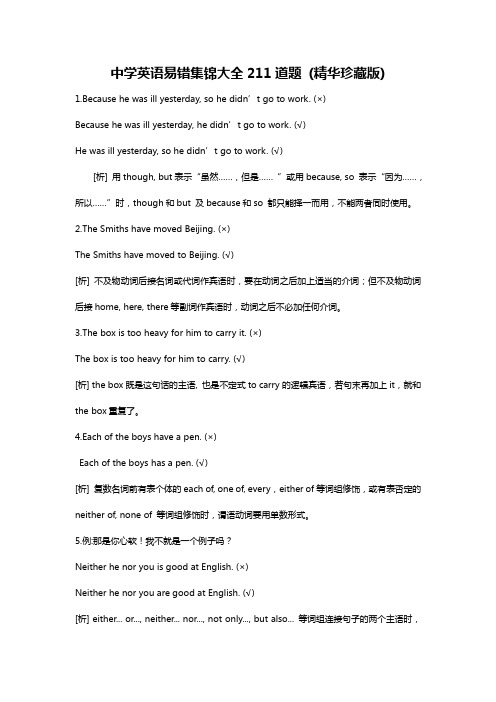
中学英语易错集锦大全211道题(精华珍藏版)1.Because he was ill yesterday, so he didn’t go to work. (×)Because he was ill yesterday, he didn’t go to work. (√)He was ill yesterday, so he didn’t go to work. (√)[析] 用though, but表示“虽然……,但是……”或用because, so 表示“因为……,所以……”时,though和but 及because和so 都只能择一而用,不能两者同时使用。
2.The Smiths have moved Beijing. (×)The Smiths have moved to Beijing. (√)[析] 不及物动词后接名词或代词作宾语时,要在动词之后加上适当的介词;但不及物动词后接home, here, there等副词作宾语时,动词之后不必加任何介词。
3.The box is too heavy for him to carry it. (×)The box is too heavy for him to carry. (√)[析] the box既是这句话的主语, 也是不定式to carry的逻辑宾语,若句末再加上it,就和the box重复了。
4.Each of the boys have a pen. (×)Each of the boys has a pen. (√)[析] 复数名词前有表个体的each of, one of, every,either of等词组修饰,或有表否定的neither of, none of 等词组修饰时,谓语动词要用单数形式。
5.例:那是你心软!我不就是一个例子吗?Neither he nor you is good at English. (×)Neither he nor you are good at English. (√)[析] either... or..., neither... nor..., not only..., but also... 等词组连接句子的两个主语时,谓语动词遵循“就近一致原则”, 即由靠近谓语的那个主语决定谓语的人称和数用何种形式。
- 1、下载文档前请自行甄别文档内容的完整性,平台不提供额外的编辑、内容补充、找答案等附加服务。
- 2、"仅部分预览"的文档,不可在线预览部分如存在完整性等问题,可反馈申请退款(可完整预览的文档不适用该条件!)。
- 3、如文档侵犯您的权益,请联系客服反馈,我们会尽快为您处理(人工客服工作时间:9:00-18:30)。
中学英语易错集锦大全211道题1.Because he was ill yesterday, so he didn’t go to work. (×)Because he was ill yesterday, he didn’t go to work. (√)He was ill yesterday, so he didn’t go to work. (√)[析] 用though, but表示“虽然……,但是……”或用because, so 表示“因为……,所以……”时,though和but 及because和so 都只能择一而用,不能两者同时使用。
2.The Smiths have moved Beijing. (×)The Smiths have moved to Beijing. (√)[析] 不及物动词后接名词或代词作宾语时,要在动词之后加上适当的介词;但不及物动词后接home, here, there等副词作宾语时,动词之后不必加任何介词。
3.The box is too heavy for him to carry it. (×)The box is too heavy for him to carry. (√)[析] the box既是这句话的主语, 也是不定式to carry的逻辑宾语,若句末再加上it,就和the box重复了。
4.Each of the boys have a pen. (×)Each of the boys has a pen. (√)[析] 复数名词前有表个体的each of, one of, every,either of等词组修饰,或有表否定的neither of, none of 等词组修饰时,谓语动词要用单数形式。
5.例:那是你心软!我不就是一个例子吗?Neither he nor you is good at English. (×)Neither he nor you are good at English. (√)[析] either... or..., neither... nor..., not only..., but also... 等词组连接句子的两个主语时,谓语动词遵循“就近一致原则”, 即由靠近谓语的那个主语决定谓语的人称和数用何种形式。
6.Ten minus three are seven. (×)Ten minus three is seven. (√)[析] 用英语表示加(plus)、减(minus)等数学运算时,谓语动词也用单数形式。
7.The number of the workers in this factory are about 5,000. (×)The number of the workers in this factory is about 5,000. (√)[析] the number of表示“……的数量”,谓语动词用单数形式;a number of 的意思是“若干”或“许多”,相当于some或a lot of,和复数名词连用,谓语动词用复数形式。
8. 例. Hello! I have important something to tell you. (×)Hello! I have something important to tell you. (√)[析] 形容词或动词不定式修饰不定代词作定语时,修饰成分要置于不定代词之后。
9. His son is enough old to go to school. (×)His son is old enough to go to school. (√)[析] enough作形容词修饰名词时,可以放在名词前,也可放在名词后;作副词修饰形容词或副词时,只能放在形容词或副词之后。
10.. Here is your sweater, put away it.(×)Here is your sweater, put it away. (√)[析] put away, pick up, put on等“动词+副词”构成的词组后接代词作宾语时,代词只能放在动词和副词之间。
11. Look! Here the bus comes.(×)Look! Here comes the bus.(√)[析] 在以here, there引起的陈述句中,若句子的主语是名词,要用倒装语序,即用“Here /There+动词+名词”结构;但主语若是代词时,则不用倒装语序, 即用“Here/There +代词+动词”结构。
12. I do well in playing football, _______. (我妹妹也行。
)A. so my sister does(×)B. so does my sister(√)Li Lei is really a football fan. --- _______. (确实这样.) A. So is he(×) B. So he is (√)[析] “so+be动词/助动词+主语”的倒装结构表示前面所述情况也适用于后者,意为“……也是这样”;“so+主语+be动词/助动词”的陈述结构表示对前述情况的肯定,意为“……确实如此”。
13.重庆比中国的其他城市都大。
Chongqing is larger than any city in China. (×)Chongqing is larger than any other city in China. (√)[析] “any city in China”包括了重庆这座城市, 同一事物自己与自己不能做比较,只有在city 前加上other才能表示重庆和中国的其它城市比较大小。
The weather in Guangzhou is warmer than Beijing. (×)The weather in Guangzhou is warmer than that in Beijing . (√)[析] 表示比较时,句子中的两个比较对象必须一致,不同的比较对象不能做比较。
错误句的比较对象分别为the weather in Guangzhou和Beijing,这两个不同类的事物之间不能做比较。
14, His sister married with a teacher last summer.(×)His sister married a teacher last summer. (√)[析] 表达“A和B结婚”,要用A married/will marry B。
这时务必要避免受汉语影响使用A married/will marry with B。
15. 例There is going to have a film tonight. (×) There is going to be a film tonight. (√)[析] 一般将来时用在There be 句式中时,be going to或will之后的动词原形只能用be,也就是说要用There is (are) going to be.... / There will be....。
16. 例I’ll go hiking if it won’t rain next Sunday. (×)I’ll go hiking if it doesn’t rain next Sunday.(√)[析] 习惯上在含有时间状语从句和条件状语从句的复合句中,如果主句的谓语动词用了一般将来时,从句的谓语动词要用一般现在时表示将来的动作。
17.例Teacher told us yesterday that the earth went around the sun. (×)Teacher told us yesterday that the earth goes around the sun. (√)[析] 习惯上在含有宾语从句的复合句中,主句的谓语动词用了一般过去时,从句的谓语动词要用过去的某种时态。
但如果从句表述的是一客观事实或客观真理时,则不受主句时态的影响,而用一般现在时。
18. All the balls are not round. 翻译成汉语:所有的球都不是圆的。
(×)并不是所有的球都是圆的。
(√)[析] all, every, both等词和not连用时,not通常放在all, every, both的后面,一般情况下表示部分否定,意为“并非……都……”。
19. 例--- He didn’t go to school yesterday, did he?-- _______, though he didn’t feel very well.A. No, he didn’t (×)B. Yes, he did (√)例--- Don’t you usually come to school by bike?-- _______. But I sometimes walk.A. No, I don’t (×)B. Yes, I do (√)[析] 习惯上英语中的yes意为“是的”,no意为“不”,但在“前否后肯”的反意疑问句或否定疑问句中,yes意为“不”,no意为“是的”。
20.---- Excuse me, is the supermarket far from here?---- No,it's about _______.A. 7 minutes walkB. 7 minute walkC. 7 minutes' walkD. 7 minute's walk答案为C。
本题考查名词所有格用法。
当名词的复数以-s结尾时,则只需要加“'”即可,则“7分钟的距离”为“7 minutes' walk”。
21. You can not imagine how much I ______ on this dress. Is it beautiful?A. paidB. tookC. costD. spent[剖析] 答案为D。
本题考察四个表“花费”的动词辨析。
主语为人,且和介词on搭配的动词是spend。
22. ---- Do you know _____ university student who is talking with Joe?---- Yes,she,s my cousin, Kate.A. aB. anC. theD. /[剖析] 答案为C。
